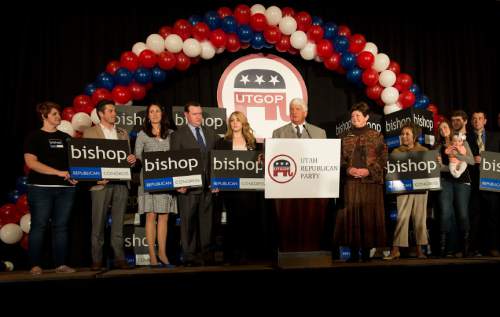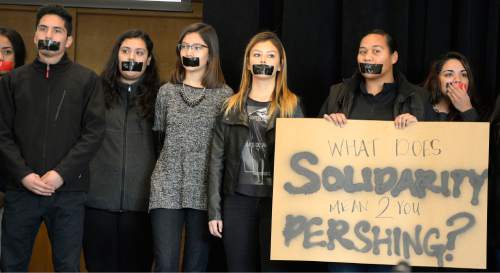This is an archived article that was published on sltrib.com in 2015, and information in the article may be outdated. It is provided only for personal research purposes and may not be reprinted.
The Utah Republican Party cannot prevent office-seekers from gathering signatures to secure a spot on the primary election ballot, according to a formal determination by Lt. Gov. Spencer Cox.
The letter, sent to Utah Republican Party Chairman James Evans on Thursday, likely sets the stage for the GOP to go to court — perhaps directly to the Utah Supreme Court — to ask for a judicial ruling on the ongoing dispute.
The party had contended that the only way to become a Republican candidate was to go through the party's nominating convention, notwithstanding SB54, passed in 2014 to allow candidates to circulate petitions to get on the ballot.
Cox said in a letter to Evans that the GOP boss's reading is incorrect, would "render the entire statute meaningless," and would go against what the Legislature intended to do in passing SB54.
"As such," Cox wrote, "I must, and intend to, allow candidates in a qualified political party the opportunity to choose between the convention system, gathering signatures or both."
Evans called the interpretation from the lieutenant governor's office "bizarre," since the state's attorney said in court that parties had discretion to have a convention or allow signature gathering.
"We don't see the [lieutenant governor's] office as being an honest broker on this issue, and a court needs to address this," Evans said. "There just appears to be something else going on here in the realm of undue influence and it has concerned me, so we'll just have to have the courts resolve this."
Evans had asked last week for the lieutenant governor's office to spell out its argument and go to court, asking a judge to decide the dispute over the different interpretations.
Cox said he sees wisdom in that path and the sooner the issue is resolved, the better.
"The uncertainty that currently exists is bad for voters," he said. "It's bad for candidates, it's bad for parties, and it's bad for the state."
The Legislature adopted SB54 as part of a compromise with the group Count My Vote, an organization of well-connected and well-funded politicos who were trying to put an initiative on the ballot that would have done away with the caucus-convention selection of nominees and required office-seekers to gather petitions.
Count My Vote had argued that the convention system put too much power in the hands of a small group of stridently partisan delegates, disenfranchising most Utahns and producing candidates who do not represent mainstream Utahns.
Instead, lawmakers agreed to a dual-track system in which candidates can either go through the traditional convention route or gather a required number of signatures to go directly to the primary ballot, or both.
The Republican Party, however, argues that the law allows the party to control its membership and has required candidates to sign a statement saying they will abide by the party's rules, which do not allow for a signature route. Therefore, candidates who decide to gather signatures are breaking that pledge and the party rules, and the party can ask to have them removed from the ballot.
Twitter: @RobertGehrke





